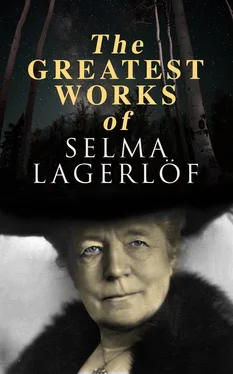The boy thought he would use the delay to figure out some plan of escape, but he was so worried he could not direct his thoughts where he would; instead he began to think of the great help that iron had been to mankind. They needed iron for everything. There was iron in the plough that broke up the field, in the axe that felled the tree for building houses, in the scythe that mowed the grain, and in the knife, which could be turned to all sorts of uses. There was iron in the horse's bit, in the lock on the door, in the nails that held furniture together, in the sheathing that covered the roof. The rifle which drove away wild beasts was made of iron, also the pick that had broken up the mine. Iron covered the men-of-war he had seen at Karlskrona; the locomotives steamed through the country on iron rails; the needle that had stitched his coat was of iron; the shears that clipped the sheep and the kettle that cooked the food. Big and little alike—much that was indispensable was made from iron. Father Bear was perfectly right in saying that it was the iron that had given men their mastery over the bears.
"Now will you or won't you?" Father Bear repeated.
The boy was startled from his musing. Here he stood thinking of matters that were entirely unnecessary, and had not yet found a way to save himself!
"You mustn't be so impatient," he said. "This is a serious matter for me, and I've got to have time to consider."
"Well, then, consider another moment," said Father Bear. "But let me tell you that it's because of the iron that men have become so much wiser than we bears. For this alone, if for nothing else, I should like to put a stop to the work here."
Again the boy endeavoured to think out a plan of escape, but his thoughts wandered, willy nilly. They were taken up with the iron. And gradually he began to comprehend how much thinking and calculating men must have done before they discovered how to produce iron from ore, and he seemed to see sooty blacksmiths of old bending over the forge, pondering how they should properly handle it. Perhaps it was because they had thought so much about the iron that intelligence had been developed in mankind, until finally they became so advanced that they were able to build great works like these. The fact was that men owed more to the iron than they themselves knew.
"Well, what say you? Will you or won't you?" insisted Father Bear.
The boy shrank back. Here he stood thinking needless thoughts, and had no idea as to what he should do to save himself.
"It's not such an easy matter to decide as you think," he answered. "You must give me time for reflection."
"I can wait for you a little longer," said Father Bear. "But after that you'll get no more grace. You must know that it's the fault of the iron that the human kind can live here on the property of the bears. And now you understand why I would be rid of the work."
The boy meant to use the last moment to think out some way to save himself, but, anxious and distraught as he was, his thoughts wandered again. Now he began thinking of all that he had seen when he flew over the mining districts. It was strange that there should be so much life and activity and so much work back there in the wilderness.
"Just think how poor and desolate this place would be had there been no iron here!
"This very foundry gave employment to many, and had gathered around it many homes filled with people, who, in turn, had attracted hither railways and telegraph wires and—"
"Come, come!" growled the bear. "Will you or won't you?"
The boy swept his hand across his forehead. No plan of escape had as yet come to his mind, but this much he knew—he did not wish to do any harm to the iron, which was so useful to rich and poor alike, and which gave bread to so many people in this land.
"I won't!" he said.
Father Bear squeezed him a little harder, but said nothing.
"You'll not get me to destroy the ironworks!" defied the boy. "The iron is so great a blessing that it will never do to harm it."
"Then of course you don't expect to be allowed to live very long?" said the bear.
"No, I don't expect it," returned the boy, looking the bear straight in the eye.
Father Bear gripped him still harder. It hurt so that the boy could not keep the tears back, but he did not cry out or say a word.
"Very well, then," said Father Bear, raising his paw very slowly, hoping that the boy would give in at the last moment.
But just then the boy heard something click very close to them, and saw the muzzle of a rifle two paces away. Both he and Father Bear had been so engrossed in their own affairs they had not observed that a man had stolen right upon them.
"Father Bear! Don't you hear the clicking of a trigger?" cried the boy.
"Run, or you'll be shot!"
Father Bear grew terribly hurried. However, he allowed himself time enough to pick up the boy and carry him along. As he ran, a couple of shots sounded, and the bullets grazed his ears, but, luckily, he escaped.
The boy thought, as he was dangling from the bear's mouth, that never had he been so stupid as he was to-night. If he had only kept still, the bear would have been shot, and he himself would have been freed. But he had become so accustomed to helping the animals that he did it naturally, and as a matter of course.
When Father Bear had run some distance into the woods, he paused and set the boy down on the ground.
"Thank you, little one!" he said. "I dare say those bullets would have caught me if you hadn't been there. And now I want to do you a service in return. If you should ever meet with another bear, just say to him this—which I shall whisper to you—and he won't touch you."
Father Bear whispered a word or two into the boy's ear and hurried away, for he thought he heard hounds and hunters pursuing him.
The boy stood in the forest, free and unharmed, and could hardly understand how it was possible.
The wild geese had been flying back and forth the whole evening, peering and calling, but they had been unable to find Thumbietot. They searched long after the sun had set, and, finally, when it had grown so dark that they were forced to alight somewhere for the night, they were very downhearted. There was not one among them but thought the boy had been killed by the fall and was lying dead in the forest, where they could not see him.
But the next morning, when the sun peeped over the hills and awakened the wild geese, the boy lay sleeping, as usual, in their midst. When he woke and heard them shrieking and cackling their astonishment, he could not help laughing.
They were so eager to know what had happened to him that they did not care to go to breakfast until he had told them the whole story. The boy soon narrated his entire adventure with the bears, but after that he seemed reluctant to continue.
"How I got back to you perhaps you already know?" he said.
"No, we know nothing. We thought you were killed."
"That's curious!" remarked the boy. "Oh, yes!—when Father Bear left me I climbed up into a pine and fell asleep. At daybreak I was awakened by an eagle hovering over me. He picked me up with his talons and carried me away. He didn't hurt me, but flew straight here to you and dropped me down among you."
"Didn't he tell you who he was?" asked the big white gander.
"He was gone before I had time even to thank him. I thought that Mother
Akka had sent him after me."
"How extraordinary!" exclaimed the white goosey-gander. "But are you certain that it was an eagle?"
"I had never before seen an eagle," said the boy, "but he was so big and splendid that I can't give him a lowlier name!"
Morten Goosey-Gander turned to the wild geese to hear what they thought of this; but they stood gazing into the air, as though they were thinking of something else.
Читать дальше












